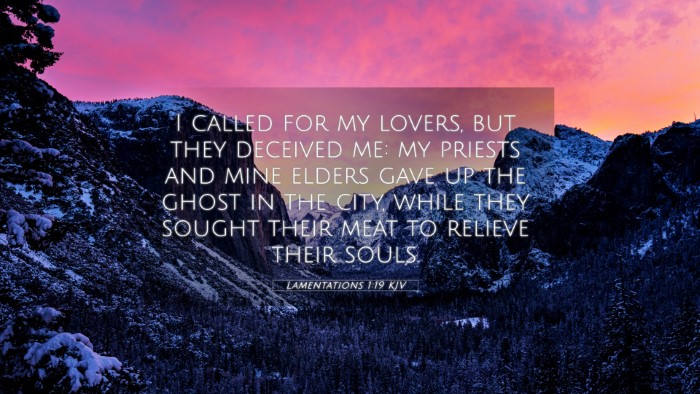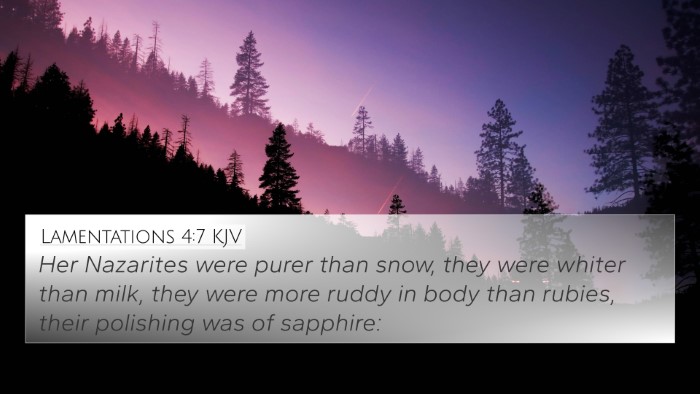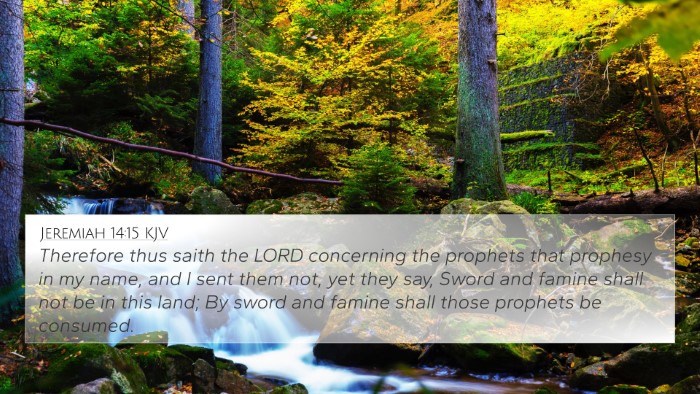Lamentations 1:19 - Verse Meaning and Interpretation
Lamentations 1:19 states, "I called for my lovers, but they deceived me: my priests and mine elders gave up the ghost in the city, while they sought their meat to relieve their souls." This verse captures a profound expression of desolation and betrayal following the fall of Jerusalem, where the speaker laments the abandonment and hopelessness felt in the wake of such catastrophe.
Commentary Insights
This verse portrays a stark picture of a community that has been forsaken. Through the lenses of various esteemed public domain commentaries, we can glean critical insights into its meaning:
-
Matthew Henry's Commentary:
Henry emphasizes the sorrow and mourning of the speaker, indicating a feeling of deep isolation. The term "lovers" refers not only to allies but also to false friends who failed to provide assistance in times of need, amplifying the sense of betrayal.
-
Albert Barnes' Notes on the Bible:
Barnes highlights the desperation of the speaker as they reach out to those they considered supportive. The use of the term "deceived" reinforces the theme of trust misplaced. It underlines the futility of relying on human help in dire circumstances.
-
Adam Clarke's Commentary:
Clarke discusses the spiritual implications of this verse, noting that the priests and elders, who were supposed to provide guidance and sustenance, have instead succumbed to despair. The need for "meat" can be seen as a metaphor for deeper spiritual nourishment that goes unfulfilled.
Thematic Connections and Cross-References
This verse resonates with several other scriptures, illustrating themes of isolation, betrayal, and the search for comfort. Below are connections between Bible verses and their significance in understanding Lamentations 1:19:
- Ecclesiastes 4:10: "For if they fall, the one will lift up his fellow: but woe to him that is alone when he falleth; for he hath not another to help him." - Reflects the importance of supportive relationships in times of trouble.
- Jeremiah 14:18: "If I go forth into the field, then behold the slain with the sword! And if I enter into the city, then behold them that are sick with hunger!" - Expresses a similar theme of devastation in the city and wilderness.
- Psalm 22:11: "Be not far from me; for trouble is near; for there is none to help." - A cry for help that echoes the emotional tone of Lamentations.
- Isaiah 53:3: "He is despised and rejected of men; a man of sorrows, and acquainted with grief." - Both verses address feelings of rejection and sorrow.
- Luke 23:49: "And all his acquaintance, and the women that followed him from Galilee, stood afar off, beholding these things." - Reflective of the abandonment and sorrow faced during moments of crisis.
- Galatians 6:2: "Bear ye one another’s burdens, and so fulfill the law of Christ." - Highlights the importance of community support that contrasts the betrayal felt in Lamentations.
- Hebrews 13:5: "For he hath said, I will never leave thee, nor forsake thee." - A reassurance that stands in stark contrast to feelings of loneliness and abandonment.
Conclusion
Understanding Lamentations 1:19 involves delving into the depths of human sorrow and the consequences of broken trust. By cross-referencing with related Biblical texts, we can obtain a nuanced perspective on suffering and hope.
For those exploring the Bible, utilizing a Bible cross-reference guide can enhance the study of similar themes and connections across scripture. By understanding how various verses interact, readers can build a comprehensive view of Scriptural messages and their relevance to personal and communal experiences.
Tools for Bible Cross-Referencing
For deeper studies, consider utilizing tools such as a Bible concordance to find cross-references or employing cross-referencing Bible study methods that illuminate parallels between Old and New Testament scriptures.
Final Thoughts
As you reflect on Lamentations 1:19, remember the broader narrative of faith that weaves through the Bible. It encourages not only the exploration of individual verses but also the discovery of rich connections and dialogues that enhance understanding and faith.















